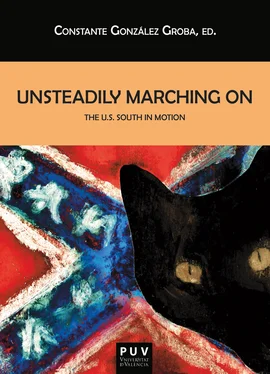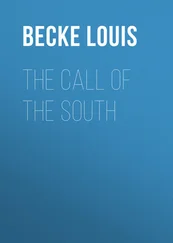AAVV - Unsteadily Marching on the U.S. South Motion
Здесь есть возможность читать онлайн «AAVV - Unsteadily Marching on the U.S. South Motion» — ознакомительный отрывок электронной книги совершенно бесплатно, а после прочтения отрывка купить полную версию. В некоторых случаях можно слушать аудио, скачать через торрент в формате fb2 и присутствует краткое содержание. Жанр: unrecognised, на английском языке. Описание произведения, (предисловие) а так же отзывы посетителей доступны на портале библиотеки ЛибКат.
- Название:Unsteadily Marching on the U.S. South Motion
- Автор:
- Жанр:
- Год:неизвестен
- ISBN:нет данных
- Рейтинг книги:4 / 5. Голосов: 1
-
Избранное:Добавить в избранное
- Отзывы:
-
Ваша оценка:
- 80
- 1
- 2
- 3
- 4
- 5
Unsteadily Marching on the U.S. South Motion: краткое содержание, описание и аннотация
Предлагаем к чтению аннотацию, описание, краткое содержание или предисловие (зависит от того, что написал сам автор книги «Unsteadily Marching on the U.S. South Motion»). Если вы не нашли необходимую информацию о книге — напишите в комментариях, мы постараемся отыскать её.
Unsteadily Marching on the U.S. South Motion — читать онлайн ознакомительный отрывок
Ниже представлен текст книги, разбитый по страницам. Система сохранения места последней прочитанной страницы, позволяет с удобством читать онлайн бесплатно книгу «Unsteadily Marching on the U.S. South Motion», без необходимости каждый раз заново искать на чём Вы остановились. Поставьте закладку, и сможете в любой момент перейти на страницу, на которой закончили чтение.
Интервал:
Закладка:
Little doubt, then, of the extreme nature of masculinity in so simple and so traditional a rendition of gender. But, leaving aside its comic purpose, such a two-dimensional definition appears unlikely and very limited; surely there is more to manliness than violent boastfulness, even within the river’s arena of desperadoes, tough flatboatmen, gamblers, adventurers and ladies who are no better than they ought to be? A more holistic definition of masculinity might include a sense of responsibility towards others, or a code of behaviour, such as Hemingway’s characters develop, which extends the range of genderdefinition beyond the physical, to encompass moral and philosophical dimensions too. To discover the additional attributes, where better to turn than to the greatest odyssey of all on the Mississippi, namely The Adventures of Huckleberry Finn . In a novel obsessed with notions of self-definition and identity, the eponymous hero’s development into moral manhood is charted as he progresses from one assumed identity to another. Identified in parenthesis on the 1884 title page as “Tom Sawyer’s comrade,” in other words, something of an afterthought in a story for boys, Huck will eventually outgrow so reductive a beginning to step from the final page of the volume into mythology, as moral exemplar and legendary conscience of his nation. Along the way, he will demonstrate in repeated key moments that there is an alternative to Colonel Sherburn’s brutally misanthropic definition of what constitutes a man. Huck’s need to repeat and reaffirm his moral decisions as part of a learning process is in keeping with the theory put forward by Judith Butler that there is a performative and repetitive quality to gender definition, a theory that in fact holds good for all the texts considered in this paper.
According to Butler, gender “operates as an interior essence ... an expectation that ends up producing the very phenomenon that it anticipates.” It achieves this by means of “performativity”: by performing the features of a particular gender, we become that gender. “Performativity,” says Butler, “is not a singular act, but a repetition and a ritual” (xv). Moreover,
gender is an identity tenuously constituted in time, instituted in an exterior space through a stylized repetition of acts . The effect of gender is produced through the stylization of the body and, hence, must be understood as the mundane way in which bodily gestures, movements, and styles of various kinds constitute the illusion of an abiding gendered self. (Butler 191)
The “exterior space” of the Mississippi is a perfect location for such rituals of self-discovery, and, as Huck demonstrates initially, for the repetition of acts that will finally confirm his identity and mature masculinity. Of the number of provisional identities which he tries on then discards again, interestingly the first in line requires him to change gender altogether. In the guise of Mary – and then Sarah – Williams, Huck convinces no-one of his femininity; rightly so, as all the gestures and styles of being of his girl-persona contradict that essential maleness that he will develop in the company of Jim while on the river. Leslie Fiedler’s reading of a chaste inter-racial love relationship between Huck and Jim, in “Come Back to the Raft Ag’in, Huck Honey!” establishes the racial harmony of the river idyll, but overlooks the central characterization of Jim in a paternal role. Both protagonists are denied adult status when ashore: one by reason of his race, the other by age and class. However, both discover in a symbiotic interaction on the mythic raft, suspended in an idealism insulated from the disappointing realities of shore life, aspects of their own being that create a fuller sense of mature masculinity. Jim’s paternal concern, though largely removed from him by the reductive infantilisation process of slavery, is nevertheless evident in the story he tells of his deaf daughter, and is transferred across race and family lines by the repeated acts of fatherly care he shows for Huck. In turn, the latter learns by repetition how to become a man of independent thought and judgement, rather than the sort of conformist whom Sherburn derides as mere members of the mob. On several occasions Huck defies the prevailing view of how to treat black people, as when he apologizes to Jim for tricking him:
It was fifteen minutes before I could work myself up to go and humble myself to a nigger – but I done it, and I warn’t ever sorry for it afterwards, neither. I didn’t do him no more mean tricks, and I wouldn’t done that one if I’d a knowed it would make him feel that way. (Twain, Huckleberry Finn 143)
Subsequently, Huck discovers further points of empathy:
[Jim] was thinking about his wife and his children, away up yonder, and he was low and homesick ... I do believe he cared just as much for his people as white folks does for their’n. It don’t seem natural, but I reckon it’s so. (Twain, Huckleberry Finn 218)
The boy’s developing moral conscience reaches its highpoint in his decision to “go to hell” rather than betray Jim, and his arrival at this mature position is a fitting climax to the idyllic days spent on the raft. Now manhood has been reached and the various false disguises of boyhood, those aliases of “George Peters,” “George Jackson,” “Adolphus” and – tellingly – “Tom Sawyer” are left behind as Huck finds his own identity. The transformation is possible not only because Huck has repeated the performance of manly empathy, but also because the river gods have sanctioned it, have created a transcendent effect in those moments when the two protagonists respond to the easy flow of the river’s spirit and relax into a blissful harmony. Not only will Jim be freed, but Huck too will be freed from the limited mindset of a shore-based boyishness, which will hold Tom Sawyer captive for the rest of his life. The identification of the river as the main highway into more intransigent slave territory is reversed, as Huck leaves his early social subservience behind and shoulders in its place a sense of morally brave masculinity.
William Faulkner discovers his own river gods in The Wild Palms , or rather in the “Old Man” narrative that constitutes half of this hybrid novel and provides counterpoint to the story of Harry and Charlotte in the title narrative. Noel Polk informs us that Faulkner objected to the title change from its original If I Forget Thee, Jerusalem (Polk 7), but the publisher’s ostensibly divisive decision to use two titles for the interlaced narratives, and to imply greater significance for the Charlotte/Harry story by awarding it the composite volume title, at least has the advantage of casting “Old Man” in clearer contrapuntal relief, as its “complete antithesis” to use Faulkner’s own description (Gwynn & Blotner, 7), which allows us to recognize its many thematic features stronger than those which bedevil the ill-fated tale of Charlotte and Harry. Again, ambiguities of gender definition and the interrogation of masculinity in “Wild Palms” are counterbalanced by a display of active, and assertive, maleness by the convict protagonist of “Old Man”.
“Wild Palms” opens with a display of the potential ambiguity of gender: the doctor wears a nightshirt rather than pyjamas which are “for dudes and women,” nevertheless he has “thick soft women’s hands” and though he has shared his marital bed for twenty-three years now, he remains childless; his wife’s nightgown is “shaped like a shroud,” symbolizing presumably the death of any sexual activity, and it is with some trepidation that he discovers that Charlotte wears “pants ... not these ladies’ slacks but pants, man’s pants” of which his wife will surely disapprove (Faulkner, Wild Palms 5). Although in “Old Man” the convict protagonist first appears sweeping and dusting in the deputy wardens’ barracks “in a long apron like a woman,” there the similarity ends (Faulkner, Wild Palms 22). Detailed to assist in flood rescue, the convict reasserts his masculinity once on the river, in a way that the shore-bound Harry cannot match. Where the latter is frequently surprised at Charlotte’s more stereotypical masculine qualities – her capable strong hands, her role as wage-earner, her willingness to initiate sexual encounters – all of which earn her the accolade that “she’s a better man than I am” (Faulkner, Wild Palms 96), the Convict by contrast is openly misogynous and utterly shuns the feminine: “This, out of all the female meat that walks, is what I have to be caught in a runaway boat with,” he complains of his pregnant passenger (Faulkner, Wild Palms 107). The counterpoint is intentionally ironic; Harry idealistically abandons convention, eschewing the rat race in which Charlotte’s aptly-nicknamed husband belongs, only to be left paradoxically in thrall to Charlotte’s love, a compromised freedom which is juxtaposed with the comically conceived reverse tale of the convict who willingly returns to prison in order to avoid women altogether. Unfortunately, romantic idealism is difficult to sustain amid the realities of economic need and gynaecological difficulty; while the conceit of an exclusive world of love may appear transcendent, Faulkner insists that a grim realism is never too far away, perhaps to reflect an autobiographical disillusion over the ending of his affair with Meta Carpenter. Instead, the possibility of transcendence and renewal is reserved for the river narrative of “Old Man.”
Читать дальшеИнтервал:
Закладка:
Похожие книги на «Unsteadily Marching on the U.S. South Motion»
Представляем Вашему вниманию похожие книги на «Unsteadily Marching on the U.S. South Motion» списком для выбора. Мы отобрали схожую по названию и смыслу литературу в надежде предоставить читателям больше вариантов отыскать новые, интересные, ещё непрочитанные произведения.
Обсуждение, отзывы о книге «Unsteadily Marching on the U.S. South Motion» и просто собственные мнения читателей. Оставьте ваши комментарии, напишите, что Вы думаете о произведении, его смысле или главных героях. Укажите что конкретно понравилось, а что нет, и почему Вы так считаете.












